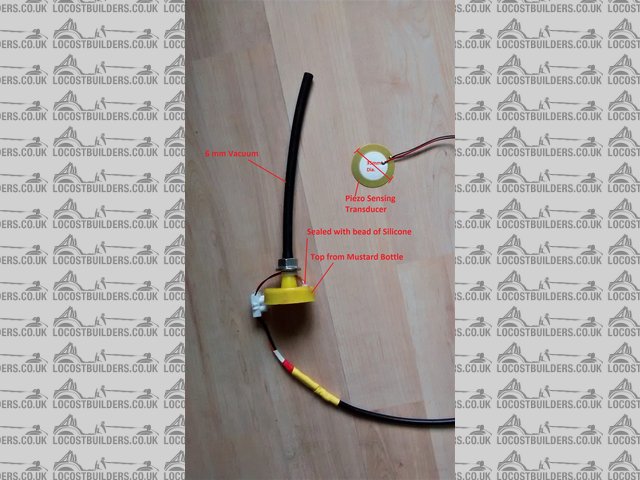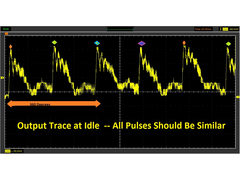britishtrident
|
| posted on 10/10/15 at 04:22 PM |

|
|
First Look Style Easy Quick Very Low Cost Injection Rail Pulse Sensor for Oscilloscope
For a while I have wanted away of diagnosing injector faults on cars without a pressure test point on the injector rail.
I came across the SenX First Look Low Pressure Pulse Sensor and on the web found it could be connected to the vacuum port on the fuel rail pressure
regulator. Searching the web I found some info on making a low pressure pulse sensor from a fuel tank pressure sensor as apparently MAP sensors are
unsuitable. However these sensors are 3 wire which complicates the construction and looking at the Senx First Look Sensor it is clearly a 2 wire
device I decided to try a simple Piezo disc transducer (also called a contact microphone or Piezo guitar pickup) and it worked first time!
This is the 2nd prototype, total cost was less than £2
 
Low Pressure Pulse Sensor
 
Pulse Sensor In Use
Connected on engine to the vacuum port on a pressure pulse damper on returnless system. It will work equally well connected to a
pressure regulator vacuum port.
Oscilloscope Trace --- I later realised it should be invereted to show dips in pressure when injectors open
 
Fuel Rail Pulse
[Edited on 10/10/15 by britishtrident]
[I] “ What use our work, Bennet, if we cannot care for those we love? .”
― From BBC TV/Amazon's Ripper Street.
[/I]
|
|
|
|
|
britishtrident
|
| posted on 10/10/15 at 04:35 PM |

|
|
More details of construction
 
Description
[I] “ What use our work, Bennet, if we cannot care for those we love? .”
― From BBC TV/Amazon's Ripper Street.
[/I]
|
|
|
Oddified
|
| posted on 10/10/15 at 08:51 PM |

|
|
Are you sure your not just seeing the individual cylinder vacuum pulses, rather than injector pulses?. Disconnect an injector and take a trace to be
sure?.
Ian
|
|
|
britishtrident
|
| posted on 10/10/15 at 09:14 PM |

|
|
quote:
Originally posted by Oddified
Are you sure your not just seeing the individual cylinder vacuum pulses, rather than injector pulses?. Disconnect an injector and take a trace to be
sure?.
Ian
It isn't connected to vacuum the vacuum line is completely disconnected and nipped off. The pulse is coming from the diaphragm in the pressure
regulator/pulse damper which with the vacuum pipe removed, only connection that remains is to fuel rail pressure via the damper/. Ever time an
injector fires there is a sharp drop in pressure in the fuel rail, the diaphragm in the pulse damper or pressure regulator moves in response, creating
a pulse on the other side of the diaphragm to which the sensor is connected.
Inlet manifold vacuum pulse wave forms tend to be much messier and not so sharply defined.
[I] “ What use our work, Bennet, if we cannot care for those we love? .”
― From BBC TV/Amazon's Ripper Street.
[/I]
|
|
|
britishtrident
|
| posted on 11/10/15 at 03:04 PM |

|
|
Link to equivalent "Official" guided test on Pico Automotive web site using a much better scope and a puka First Look Sensor
https://www.picoauto.com/library/automotive-guided-tests/fuel-pressure-regulator-vacuum-vs-ignition
[I] “ What use our work, Bennet, if we cannot care for those we love? .”
― From BBC TV/Amazon's Ripper Street.
[/I]
|
|
|
Oddified
|
| posted on 12/10/15 at 04:46 PM |

|
|
quote:
Originally posted by britishtrident
quote:
Originally posted by Oddified
Are you sure your not just seeing the individual cylinder vacuum pulses, rather than injector pulses?. Disconnect an injector and take a trace to be
sure?.
Ian
It isn't connected to vacuum the vacuum line is completely disconnected and nipped off. The pulse is coming from the diaphragm in the pressure
regulator/pulse damper which with the vacuum pipe removed, only connection that remains is to fuel rail pressure via the damper/. Ever time an
injector fires there is a sharp drop in pressure in the fuel rail, the diaphragm in the pulse damper or pressure regulator moves in response, creating
a pulse on the other side of the diaphragm to which the sensor is connected.
Inlet manifold vacuum pulse wave forms tend to be much messier and not so sharply defined.
Ah ok, i missed the disconnecting the vac line bit. Interesting 
Probably not so good for testing on a batch fired injector system though lol
Ian
|
|
|
v8kid
|
| posted on 12/10/15 at 07:18 PM |

|
|
.
Ah ok, i missed the disconnecting the vac line bit. Interesting 
Probably not so good for testing on a batch fired injector system though lol
Ian
I thought batch fired injectors were going the way of carburetors? Am I missing summat 
Cheers!
You'd be surprised how quickly the sales people at B&Q try and assist you after ignoring you for the past 15 minutes when you try and start a
chainsaw
|
|
|
Oddified
|
| posted on 12/10/15 at 09:32 PM |

|
|
quote:
Originally posted by v8kid
.
Ah ok, i missed the disconnecting the vac line bit. Interesting 
Probably not so good for testing on a batch fired injector system though lol
Ian
I thought batch fired injectors were going the way of carburetors? Am I missing summat 
Cheers!
The lol on the end meant it wasn't a serious comment 
Ian
|
|
|
britishtrident
|
| posted on 14/10/15 at 05:23 PM |

|
|
This project is now on a back burner I tried a couple of other prototypes but I wasn't 100 percent happy with the results. As the puka sensor is
now available at a dradtically reduced price so I may actually pay over the counter the money as I can see this might be useful for use fuel rails
without a Schrader valve or where the injector electrical connectors are difficult to access.
There is another pressure sensor project on the go --- and it is producing truly excellent results.
[Edited on 14/10/15 by britishtrident]
[I] “ What use our work, Bennet, if we cannot care for those we love? .”
― From BBC TV/Amazon's Ripper Street.
[/I]
|
|
|
Oddified
|
| posted on 14/10/15 at 06:15 PM |

|
|
quote:
Originally posted by britishtrident
This project is now on a back burner I tried a couple of other prototypes but I wasn't 100 percent happy with the results. As the puka sensor is
now available at a dradtically reduced price so I may actually pay over the counter the money as I can see this might be useful for use fuel rails
without a Schrader valve or where the injector electrical connectors are difficult to access.
There is another pressure sensor project on the go --- and it is producing truly excellent results.
[Edited on 14/10/15 by britishtrident]
Sounds interesting. Is it accurate enough to be able to see varying flow rates between injectors (ie partially blocked or mismatch flows) or just more
for tracing none working injectors where it's not easy to disconnect one at a time?.
Ian
|
|
|













